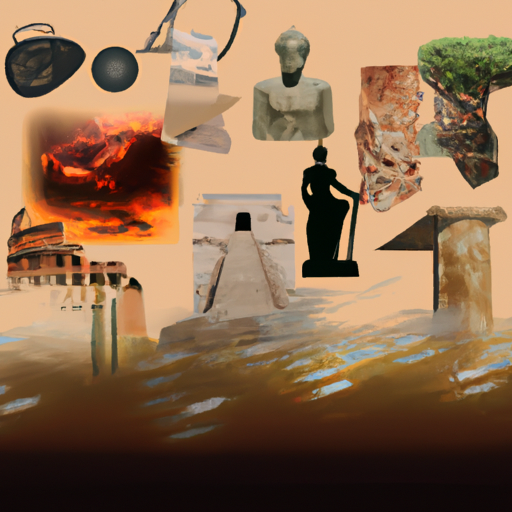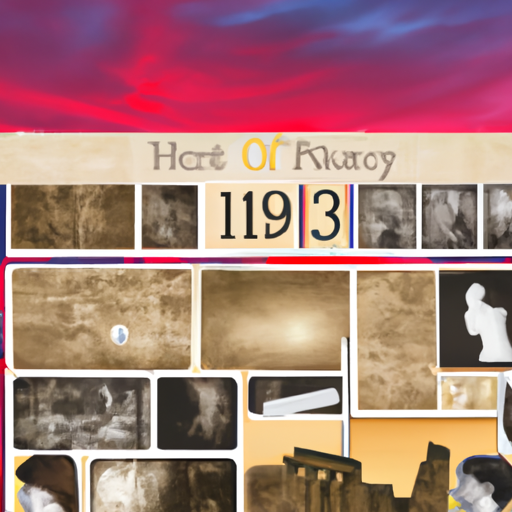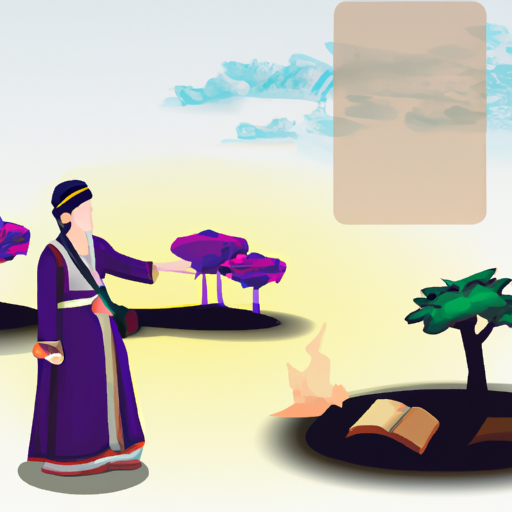History of How Islam Was Brought to Egypt
Unearth the past of Egypt to discover who introduced Islam to this venerable terrain! Delve into the annals of time, and uncover the secrets of this ancient civilization. Uncover the mysteries that have been shrouded in obscurity for centuries. Who brought forth this faith to a place so steeped in antiquity? Uncover the answer and discover a new perspective on history!

In a crisis, people will turn to plants once again for both food and medicine.
And there are some plants that will vanish faster than all others.
So the only way to make sure you have them when you need them is to grow them in your own backyard.
P.S. However, there is a limited number of these seeds and the demand is huge–no wonder, with all that’s happening in the world right now. Click here to see if there are any left for you!
Mystery and history intertwine in the ancient land of Egypt, where for centuries civilizations and religions have flourished. But who was responsible for introducing one such faith to this region? To unravel this enigma, we must journey back in time to the 7th century CE.
It was then that Muslim conquerors began their conquest over Egypt under the guidance of Amr ibn al-As, sent by Umar ibn al-Khattab, the second caliph of Islam. After a series of military campaigns against Byzantine forces, Amr and his army were able to gain control over much of Egypt.
This invasion brought with it a wave of Islamic culture and teachings that had never been witnessed before in this area. This included the construction of mosques and madrasas (Islamic schools), as well as other religious institutions that served to spread Islamic knowledge throughout the country. Moreover, many Egyptian converts to Islam studied its texts and teachings to become more knowledgeable about their new faith.
The introduction of Islam into Egypt not only altered its religious landscape but also had an impact on its political structure. As time went on, more Muslims settled in Egypt and became involved in its government and society at large. This eventually led to a shift from mainly Christian population to one which equally embraced Christianity and Islam alike.
Currently, Egypt is populated by millions of Muslims who practice their faith openly throughout the nation; it is estimated that nearly 90% of Egyptians are Muslim today! From its genesis initiated by Amr ibn al-As centuries ago, Islam has become an integral part of Egyptian life and culture – something which can be credited largely due to his efforts all those years ago.
.
Introduction

Mysteriously, one of the earliest known occurrences of a faith being practiced in Egypt dates back to the 7th century. It is said that a group of followers were sent to preach in the area, and by 641 CE, it had become part of a Muslim Caliphate. Through time, this religion has played a significant role in forming the culture and society of Egypt, with an abundance of Egyptians following its teachings. Presently, Islam is practiced by more than 90% of the population and is considered to be the main religion in Egypt.
– History of the Islamic Conquests in Egypt
A perplexing and tumultuous journey through time, Egypt has seen its fair share of invaders and conquerors. In 639 AD, Amr ibn al-As led an Arab Muslim army to capture Alexandria, beginning a period of swift expansion for the Muslims as they spread their rule throughout North Africa and into Spain. By 641 AD, most of Egypt had been conquered and Fustat (modern-day Cairo) was established as the new capital. The Muslim rulers brought with them their faith and culture, introducing new forms of art and architecture, laws, and customs that would be upheld for centuries to come.
In 1169 AD, Saladin arrived on the scene; a Kurdish general appointed by Nur ad-Din of Syria and Iraq to lead his forces against Christian armies in Palestine. Saladin succeeded in conquering much of Palestine before turning his attention to Egypt which he captured from the Fatimids two years later. His victory marked a major milestone for both Egypt and Islam as it solidified Muslim power across North Africa while ushering in an era of peace and prosperity for the region. Under Saladin’s rule, Egypt experienced unprecedented growth as he encouraged trade with other parts of the world while investing into infrastructure projects such as irrigation systems which helped bring about agricultural advances. He also allowed religious freedom for non-Muslims living under his rule which further strengthened ties between different cultures within Egypt.
The Mamluks replaced Saladin’s dynasty in 1250 AD following several decades of civil war between various factions vying for power. They continued many aspects of his policies while introducing their own administrative reforms that helped ensure stability throughout much of their reign until 1517 when they were overthrown by Ottoman forces led by Sultan Selim I. The Ottomans maintained control over Egypt until 1805 when it became part of Muhammad Ali’s dynasty which lasted until 1952 when it was overthrown by a military coup led by Gamal Abdel Nasser that established modern day Egypt’s Republic government system still in place today. Throughout its long history, Islamic conquests have left an indelible mark on Egyptian culture – from its art to its laws – making it one of the most influential civilizations ever known to man.
– The Impact of Islam on Egyptian History
A force of immense magnitude and far-reaching consequences descended upon Egypt in the 7th century, bringing about a seismic shift to its society, culture, and history. An influx of Muslim armies brought with them their faith and customs, initiating a long period of Islamic rule that would profoundly shape the country.
The introduction of Islam saw traditional religious practices such as polytheism replaced by monotheism, with Allah becoming the primary deity. This change was accompanied by a new legal system based on Sharia that superseded existing laws. This had an immense impact on social structure, including the abolishment of slavery and improved rights for women.
The influence of Islam was also visible in Egyptian culture and art. Arabic became the language of government and literature while architecture and design were heavily influenced by Islamic styles. Numerous mosques were built all over Egypt while other religious monuments such as minarets appeared in major cities like Cairo. Islamic scholars played an important role in preserving ancient knowledge by translating books from Greek into Arabic during this period.
The legacy left behind by Islam can still be seen today throughout Egypt – from its culture to its legal system – making it clear that without this influential religion, it would not have become one of the most powerful civilizations in history.
– Early Islamic Dynasties in Egypt
A convoluted and tumultuous narrative of Islamic dynasties in Egypt is one that captivates and intrigues. The Umayyads, who first took power in 641 CE, initiated a number of changes, such as the adoption of Islam as the official religion and the founding of an Islamic government. Then came the Abbasids in 750 CE; they established a flourishing trade network connecting Egypt to other parts of the world and built religious institutions like mosques and madrasas. Later on, the Fatimid Dynasty (969 CE) brought about a strong military presence and spread Shi’a Islam throughout Egypt, while also constructing remarkable monuments like Al-Azhar Mosque and University. Finally, after centuries of Islamic rule, Ottoman control was implemented in 1517 CE until 1882 CE. Despite this lengthy period under foreign occupation, Egyptian culture managed to maintain its Islamic character due to continued religious practice and traditional customs. This legacy still influences current-day Egypt today.
– Religious Tolerance During the Islamic Period in Egypt
Throughout the ages, Egypt has seen a plethora of diversity in terms of religious beliefs and practices. In the early years of Islam, Muslims were exceptionally open-minded to different faiths, allowing them to practice freely within the country. This period saw a culture that was inclusive of all backgrounds, with many people from various religions coming together to form a harmonious society.
The Fatimids further entrenched this tradition of tolerance during their 10th century rule by permitting Jews and Christians to practice their faith without any interference or persecution. Moreover, this era saw an increase in trade between Egypt and other countries which helped bring new ideas and cultures from around the world. The Fatimids also encouraged scientific advancement by establishing research centers and universities which contributed greatly to Egypt’s intellectual development.
The Mamluks continued this trend of acceptance by promoting peaceful coexistence amongst its citizens regardless of what they believed or practiced. There were no restrictions on religious expression as long as respect for each other’s beliefs was maintained.
The Ottoman Empire took control over Egypt in 1517 but kept up the tradition of religious tolerance throughout their rule. They welcomed many Jewish refugees into the country after fleeing persecution in Europe and allowed them to practice their faith without fear of retribution or discrimination. This openness towards different religions made it possible for Egyptians to maintain their own beliefs while living peacefully alongside those who practiced differently than themselves.
Religious tolerance during the Islamic period in Egypt has been instrumental in forming today’s society; providing a platform for people from all walks of life to come together peacefully regardless of their faith or background, allowing them to share ideas, learn from one another, and ultimately create a stronger nation as a whole.
– The Spread of Islam Through Trade and Missionaries to Egypt
A captivating piece of history, the propagation of Islam through trade and missionaries to Egypt is an incredible event. It is thought that the first Muslims appeared in Egypt around 641 AD, during Caliph Umar ibn al-Khattab’s leadership. The spread of Islam was assisted by both trade and preachers.
Commerce routes offered a major way for the spread of Islam. Traders from across the Middle East brought their wares to Egyptian markets, regularly bringing along their own spiritual convictions. This enabled them to introduce Islamic teachings to Egyptians who had not been aware of it before. Furthermore, traders often wed locals, which further helped disperse the religion in Egypt.
Missionaries also had a significant part in the spread of Islam in Egypt. A lot of Muslim evangelists traveled throughout Egypt, propagating their faith and converting people to Islam. These missionaries were well-received by many Egyptians who were looking for another religion after centuries of Christian rule.
The combination of trade and missionary work aided make Islam a significant religion in Egypt. By the time of the Fatimid Caliphate (969-1171), most Egyptians had converted to Islam, making it one of the most influential forces in the region then. At present, more than 90 percent of Egyptians are Muslim, making it one of the most populous countries with regards to Islamic followers worldwide.
conclusion

A seismic shift occurred in the 7th century, when Egypt was introduced to Islam through the Arab conquest headed by Amr ibn al-As. This momentous event transformed the demography of the country from one primarily composed of Christians and Jews to a largely Islamic population. The repercussions of this transformation are still felt today.
.
Some questions with answers
Q1: Who brought Islam to Egypt?
A1: Islam was brought to Egypt by the Muslim Arabs during the 7th century.
Q2: When did Islam arrive in Egypt?
A2: The Muslim Arabs arrived in Egypt during the 7th century, bringing with them the teachings of Islam.
Q3: How did Islam spread throughout Egypt?
A3: Islam spread throughout Egypt through conquest and conversion. The Arab conquerors brought Islamic rule to much of the country, while many Egyptians converted due to a desire for religious freedom and social justice.
Q4: What impact did the arrival of Islam have on Egyptian culture?
A4: The arrival of Islam had a major impact on Egyptian culture. It introduced new laws, customs, and beliefs that were adopted by many Egyptians. It also led to a period of great cultural exchange between the Arab world and Egypt.
Q5: How has Islamic history shaped modern day Egypt?
A5: Islamic history has shaped modern day Egypt in many ways. It has influenced politics, art, architecture, literature, and language. Many aspects of daily life in modern day Egypt are rooted in its Islamic past.





